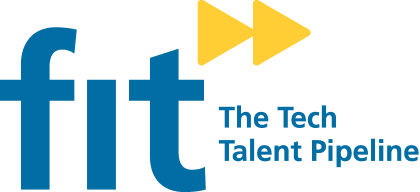Courses
With over 200 courses to choose from, there’s one that’s just right for you.




Popular ICT Courses
Check out the most popular ICT Courses and see if you can find your perfect FIT
Course FAQs
Are the courses full-time?
Most of our courses require full-time daily attendance. However, it can vary so please ensure to check out the details on the course specific page.
Will I receive payment/training allowance for the course?
Those eligible will receive payment while attending the course. To ensure you are fully informed on your individual entitlements, please contact your local Intreo Office for details on employment and income supports.
What supports do I receive from FIT?
FIT Training & Employment Officers provide expert career advice and support to all students throughout and after their course. Your Training & Employment Officer will provide CV Workshops, Mock Interviews and Company Visits to best prepare you for your future career.
How do I know if I am eligible to participate in a programme?
Details on eligibility vary from course to course so make sure you check out the entry requirements section in each course page or via the FETCH link provided. If you have any further queries, don’t hesitate to get in touch with the FIT Team on (01) 8825570 or email your question to info@fit.ie
Am I entitled to Childcare support?
If you have applied for a vocational training course, you may need childcare. Under the Childcare Employment and Training Support (CETS) scheme, you could qualify for a subsidised childcare place for your child. CETS can provide full-time, part-time or after-school childcare places. The CETS scheme is managed by the Department of Children and Youth Affairs (DCYA) via the City and County Childcare Committees.
Vocational Training Opportunities Scheme (VTOS)
If you are over 21 years of age, are unemployed and have been getting certain social welfare payments for at least 6 months you can apply for the Vocational Training and Opportunities Scheme (VTOS). This scheme provides a range of courses to meet the education and training needs of unemployed people. It gives participants opportunities to improve their general level of education, gain certification, develop their skills and prepare for employment, self-employment and further education and training.
VTOS is operated through local Education and Training Boards and is aimed at unemployed people who are early school-leavers.
Back to Education Initiative (BTEI)
The Back to Education Initiative (BTEI) provides part-time further education courses mainly for people with less than upper second-level education.
It gives individuals the opportunity to combine learning with family, work and other responsibilities. Anyone who has left full-time education can take part in a course, but priority will be given to those with less than upper second-level education.
BTEI courses are usually level 3 and 4 on the National Qualification Framework (NFQ). The BTEI allows people to study part-time (up to 400 hours per year). It is possible to obtain a major award at NFQ levels 1-6 where part-time courses are undertaken on a modular basis over time and combined to complete a major award.
Back to Education Allowance (BTEA)
If you are unemployed, parenting alone or have a disability and are getting certain payments from the Department of Employment Affairs and Social Protection (DEASP), you may take part in a second-or third-level education course and get a Back to Education Allowance (BTEA).
Student Universal Support Ireland (SUSI Grant)
The Student Grant Scheme is the main financial support scheme for students. The Scheme is governed by legislation made under the Student Support Act 2011. Student grants are divided into maintenance grants, fee grants and the postgraduate contribution. This document only deals with undergraduates. Postgraduates can get information about financial assistance in our document, Postgraduate student grants.














